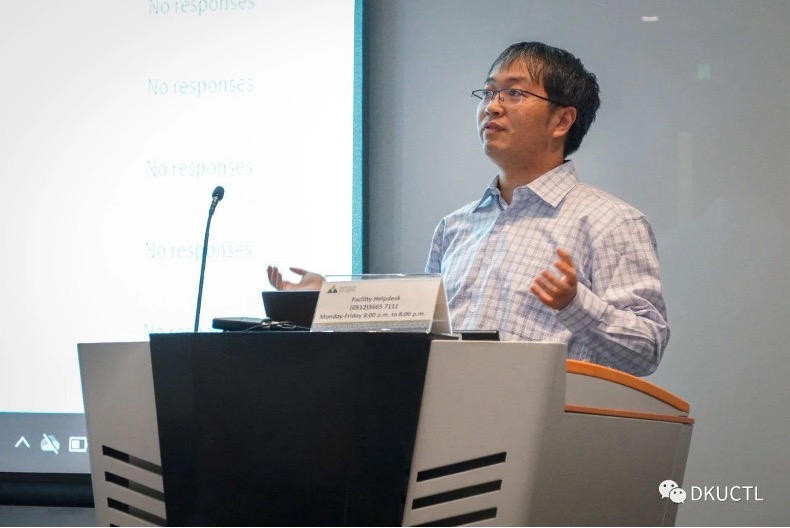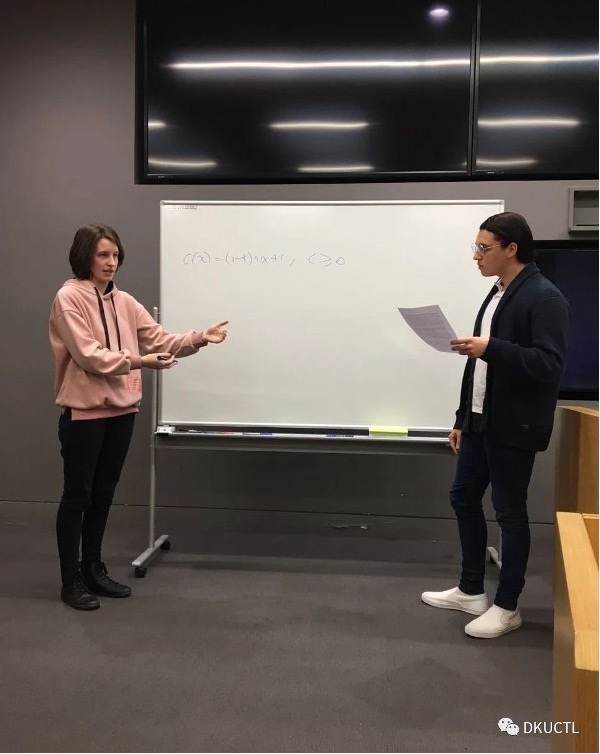By Jasmine Xiao, Lingli Tang
Jasmine Xiao, ’22, interviewed Dr. Xiaochen Zhang, Assistant Professor of Applied Economics, about his design of guided interaction with ECON 101 students in and outside of the classroom. This teaching story is the collaborative efforts of Jasmine Xiao and Dr. Xiaochen Zhang. Lingli Tang also contributed to the editing work.

All four walls of his office are glass. While some may complain about the fishbowl nature of it, the office nicely matches his teaching philosophy and strives to be accessible to all students. Prof. Zhang is currently teaching the introductory ECON 101 course at Duke Kunshan University (DKU). This is the fifth time Prof. Zhang has taught this course and the most exciting part of ECON 101 is the opportunity to introduce economics to new students. Most of his students are freshmen who have just arrived at DKU, and don’t really know about this discipline – many students confuse economics with finance. However, Prof. Zhang sees it as a great opportunity to teach students to think like an economist. “I hope to open a new window for the students – the analytic framework of supply and demand can be applied to real phenomenon in our daily life,” he explains.
Prof. Zhang understands that ECON 101 is not only an introductory course, but also an important divisional foundation course. There are students to whom ECON 101 is their first time learning the subject, and there are also students who have already known about economics and are taking the class only to fulfill the major requirement. After his first time of teaching at DKU, Prof. Zhang discovered such diversity among students, and worked hard to ensure students of all levels can be engaged in class, while the materials are still manageable for new students. In summer 2019, by working with colleagues and the leadership of Undergraduate Studies, he designed a placement exam for the incoming students. Those who had exposure to economics in high school and passed the placement exam can bypass ECON 101.
Hold general and structured office hours
Prof. Zhang strongly believes that student-faculty interaction is vital to students’ education.
To maintain interaction with students and provide more opportunities for discussion after class, Prof. Zhang holds regular office hours for general Q&A and also structures some sessions for guided conversations. His office hours provide opportunities for students to come to discuss about their future academic plans, in addition to course content. For example, after mid-term exams, Prof. Zhang strongly encourages students to stop by and discuss the improvement plans for the second half of this course. He also takes this opportunity to solicit suggestion and comments from students. By strongly maintaining student-faculty interaction, Prof. Zhang stays updated on students’ progress in academic learning.
Even though amid coronavirus (COVID-19), all courses have been transitioned to online teaching which brought great challenges to student-faculty interactions, Prof. Zhang still managed to hold virtual office hours multiple times per week to accommodate different time zones as his students were all around the world. Besides, all office hours are scheduled on the same day of synchronous Zoom meetings, so that students can ask questions immediately. To help students with their finals, he also holds additional office hours to answer students’ questions.
Use interactive polling as classroom assessment
In the classroom, students can engage with the instructor, peers and the course content in several ways. In addition to the active learning activities, such asguided group discussion, peer instruction, debate, and group presentation, Prof. Zhang also recommends non-verbal engagement, such as using index cards and instant polling to assess student learning progress in the classroom. It has been proved by literature that non-verbal engagement also plays an important role and is sometimes preferred by Asian students and second language learners (Kim, 2020).1

Prof. Zhang utilizes the instant polling system “Poll Everywhere” either at the beginning of or at the end of every class to invite students to express their understanding of the course materials in a non-verbal way. The competition mode of Poll Everywhere that Prof. Zhang designs further increases students’ extrinsic motivation to actively engage with the material.These questions will not affect student’s final grade but provide a good opportunity for students to review what they have learned. Prof. Zhang can also keep abreast of their academic progress through Poll Everywhere. Students look forward to answering the competition questions, and the one who scores highest will receive applause in the class. As one student stated, “The use of Poll Everywhere in class allows me to actively participate throughout the lecture and is useful in maintaining my attention.”

Though sometimes students may ask very basic or even “trivial” questions during the interaction with the instructor, Prof. Zhang has been very patient with them. “I also learn while teaching (‘教学相长’),” said Prof. Zhang. “Their questions can motivate me to reflect on some very basic economic principles, which I would have never thought about if I only focus on reading cutting-edge research articles,” he added.
Reference
- Kim, Y. (2020). The Value of Interactive Polling and Intrinsic Motivation When Using English as a Medium of Instruction. Sustainability, 12(4), 1332.
Faculty Introduction

Assistant professor of applied economics, Duke Kunshan University
Dr. Zhang’s primary research interests are in regional and urban economics. His current research focuses on a wide range of topics in applied economics, such as policy evaluation and the impacts of population aging on local labor markets.
Zhang has a bachelor’s degree in economics from Shandong University, an M.Sc. in population, resource and environmental economics from Fudan University and a Ph.D. from Ohio State University. He has also obtained a Graduate Interdisciplinary Specialization in Demography. At DKU, he has taught courses including ECON101 Economic Principles, ECON310 Urban Economics, and PUBPOL890K Advanced Topics in Public Policy.


